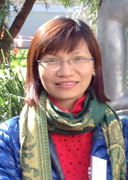PHAM Thị Ngọc Bích
Vietnam: family doctor

Dr Bích Phạm, MD, MScFM is a Lecturer, in the Family Medicine Department of Hanoi Medical University, Vietnam
How did you come to be a family doctor in Vietnam?
Family Medicine is very new field in my university as well as in Vietnam with only 10 years since its development. At that time I had just obtained my medical doctor degree and worked in the department of family medicine of Hanoi Medical University. We very much liked family medicine as a new specialty in our country. It is very much an honor and a source of pride to me, that I became the first Master of Family Medicine, of Vietnam. I graduated. in 2008. at University of the Philippines Manila. After finishing the Masters degree, I worked as a lecturer, with the responsibility to teach students the principles of Family Medicine, both in theory and practice.
Nowadays, I am also a consultant in the Family Medicine Clinic of the Hospital of Hanoi Medical University. I have been lucky enough to have studied three months of Family Medicine in Australia and three weeks in the US.
What is the main part of your work?
I try to apply the knowledge that I learnt in the US, Australia and Philippines to teach students and to treat patients. With the responsibility of being in charge of post-graduate training in the department, I have taken part in the design of the curriculum of the Masters program of Family Medicine and other postgraduate training. All of my work is to promote the development of the Family Medicine department as well as Family Medicine clinic, in Hanoi Medical University Hospital.
I love to take care of and manage patients following family medicine principles: comprehensive care, continuity of care, coordination of care…
What other things have you done?
I have participated in much scientific research: evaluating the patient's level of satisfaction with family physicians; needs assessment, feasibility and necessary conditions for the implementation of family physician services in Vietnam; assess the status and health care needs in the household; to propose application the family medicine model in the care and management of patients at grassroots level especially at community health stations in Vietnam.
I currently participate as a member of the editorial board of the Vietnamese government schemes to develop an experimental model of family doctors’ clinic in the community, to reduce the overload in central hospital.
I have been a member of the Vietnam Association of Family Physicians from 2005.
Can you tell me about your involvement in Wonca?
I became a member of the WONCA Working Party on Women in Family Medicine (WWPWFM), in 2008, so that I could have a lot of opportunities to learn and share about patient care and training experiences in family medicine with other women family physicians globally. The WWPWFM has become a common house where we are able to confide in our colleagues and express the advantages and disadvantages in life, especially keeping equality of gender in our workplaces and keeping the balance between family and work. I have two sons and I have to work in hospital from 7am to 5pm. When my WWPWFM colleagues listened to me and I was able to share invaluable experiences in work, it made me more self-confident in the practice of family medicine in my work.